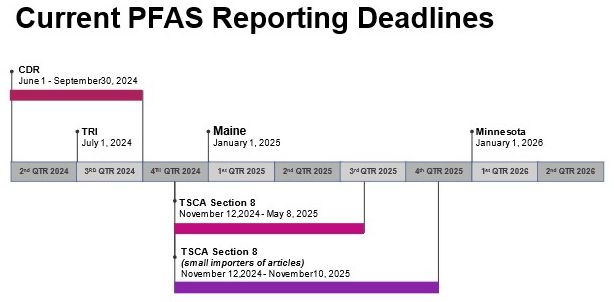Many companies that were unaffected by Per- and Polyfluoroalkyl Substances (PFAS) reporting obligations will likely have to comply with the new reporting obligations illustrated in the Figure below. Just last week, the U.S. Environmental Protection Agency (EPA) issued a pre-publication final rule that eliminates the de minimis exemption for PFAS reporting under Toxic Release Inventory (TRI) Reporting pursuant to Section 313 of the Emergency Planning and Community Right to Know Act (EPCRA). Companies that qualified for simplified TRI reporting for PFAS will have to comply with more substantial reporting obligations in the upcoming years. This rule comes less than two weeks after the publication of the PFAS Section 8(a) Reporting Rule under the Toxic Substances Control Act (TSCA). More details regarding that rule can be found in Wiley's alert. Emerging state reporting rules are even broader in scope and will add an additional layer of potentially (or partially) duplicative reporting. Now more than ever it is important for companies to conduct due diligence within their company and their supply chain and ensure they know what PFAS-related information they must report and when.

The content of this article is intended to provide a general guide to the subject matter. Specialist advice should be sought about your specific circumstances.
We operate a free-to-view policy, asking only that you register in order to read all of our content. Please login or register to view the rest of this article.


